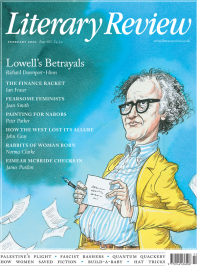John Gray
How the West was Lost
The Light that Failed: A Reckoning
By Ivan Krastev & Stephen Holmes
Allen Lane 246pp £20
‘Populists are rebelling not only against a specific (liberal) type of politics but also against the replacement of communist orthodoxy by liberal orthodoxy,’ write Ivan Krastev and Stephen Holmes. For Krastev, a Vienna-based political scientist who witnessed the communist collapse in his native Bulgaria, and Holmes, an American political theorist who has written widely on contemporary challenges to liberalism, the rise of populist movements in eastern and central Europe represents the failure of a project of imitation. In the immediate aftermath of the implosion of the Soviet Union, post-communist states were encouraged to think of themselves as facing an ‘uphill struggle to become, at best, an inferior copy of a superior model’. In practice, ‘transition to democracy’ became a process of humiliation in which historical identities had to be set aside or suppressed. Devaluing their national cultures in a manner reminiscent of Soviet dominion, this liberal orthodoxy quickly came to be resented.
In order to be ‘normalised’ and ‘modernised’, post-communist states had to accept that there was no alternative to the Western model that had seemingly emerged triumphant from the fall of communism. Post-communist liberals wanted to return eastern and central Europe to normality, and normality meant the West. But the Western model that post-communist countries were urged to emulate was in decline. The project of imitation assumed that Western elites were knowledgeable and competent. With the financial crisis of 2008, it became clear that they were not. ‘This is why 2008 had such a shattering ideological, not merely economic, effect both regionally and worldwide,’ write the authors. No one wants to copy a political model that is so badly managed it barely succeeds in avoiding disaster. The stable normality to which post-communist countries wanted to return no longer existed.
The idea that imitation explains much of human behaviour is not new. As the authors note, it is central to the work of the French cultural historian, anthropologist and philosopher René Girard (1923–2015). The French-Caribbean psychoanalytical thinker and anti-colonial revolutionary Frantz Fanon (1925–61) wrote of Africa’s ‘nauseating mimicry’ of the

Sign Up to our newsletter
Receive free articles, highlights from the archive, news, details of prizes, and much more.@Lit_Review
Follow Literary Review on Twitter
Twitter Feed
How to ruin a film - a short guide by @TWHodgkinson:
Thomas W Hodgkinson - There Was No Sorcerer
Thomas W Hodgkinson: There Was No Sorcerer - Box Office Poison: Hollywood’s Story in a Century of Flops by Tim Robey
literaryreview.co.uk
How to ruin a film - a short guide by @TWHodgkinson:
Thomas W Hodgkinson - There Was No Sorcerer
Thomas W Hodgkinson: There Was No Sorcerer - Box Office Poison: Hollywood’s Story in a Century of Flops by Tim Robey
literaryreview.co.uk
Give the gift that lasts all year with a subscription to Literary Review. Save up to 35% on the cover price when you visit us at https://literaryreview.co.uk/subscribe and enter the code 'XMAS24'